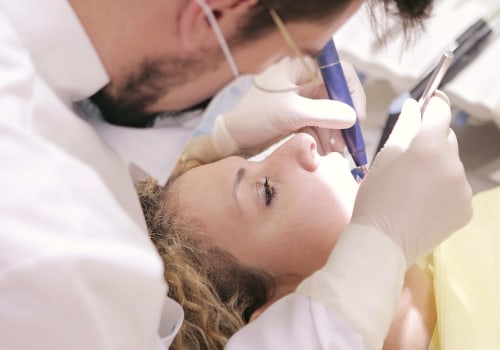Are you curious about the early signs of dental trouble? Well, we've got you covered!
In this article, we'll be discussing what those warning signs are and why it's crucial to pay attention to them.
From tooth sensitivity to bleeding gums, our aim is to provide you with the knowledge needed for better oral health.
So join us as we explore the telltale indicators that could save your smile in the long run.
Let's dive right in!
TLDR
- Toothache is a common early warning sign of dental trouble, indicating tooth decay, cavities, gum disease, or infections.
- Sensitivity to hot or cold foods can be an early sign of dental issues, indicating tooth decay, gum disease, enamel erosion, or cavities.
- Swollen or bleeding gums are a common early warning sign of gum disease, caused by poor oral hygiene, hormonal changes, medications, or smoking.
- Persistent bad breath can be caused by poor oral hygiene, certain foods and drinks, smoking, dry mouth, or underlying health conditions, and may indicate dental or health issues.
Early Signs of Dental Trouble
When it comes to dental health, recognizing the common early warning signs is crucial.
As a team, we understand the importance of prompt dental care in addressing these issues before they escalate.
Common Early Warning Signs
As we delve into the topic of common early warning signs of dental trouble, it is important to address key points. These include toothache, sensitivity to hot or cold foods, swollen or bleeding gums, persistent bad breath, and discoloration or staining of teeth. These symptoms can often indicate underlying issues that require attention from a dental professional.
Toothache
If you're experiencing a toothache, it's important to schedule a dental appointment as soon as possible. A toothache can be a sign of various dental issues such as tooth decay, dental cavities, or gum disease.
It may also indicate tooth sensitivity, a dental abscess, or even a tooth infection. During your appointment, the dentist may perform treatments like dental fillings or recommend further procedures like tooth extraction if necessary.
Don't ignore dental pain; seek professional help promptly for proper diagnosis and treatment.
Sensitivity to Hot or Cold Foods
Experiencing sensitivity to hot or cold foods could indicate dental issues such as tooth decay or gum disease. Tooth sensitivity, also known as temperature sensitivity, can cause oral pain and discomfort. Sensitivity issues may arise due to enamel erosion, exposed tooth roots, or cavities.
To manage tooth sensitivity, it is important to identify the underlying cause and address it accordingly. Remedies include using desensitizing toothpaste and avoiding acidic or sugary foods. Prevention involves maintaining good oral hygiene practices and regular dental check-ups.
Swollen or Bleeding Gums
You should be aware that swollen or bleeding gums can be a sign of gum disease. Maintaining good oral hygiene is crucial for gum health and preventing gingivitis.
Causes of swollen gums include poor oral hygiene, hormonal changes, certain medications, and smoking. Gum bleeding causes may include aggressive brushing or flossing, vitamin deficiencies, and certain medical conditions.
Regular dental check-ups are important for early detection and treatment of gum disease.
Here are some gum care tips: brush twice a day, floss daily, use an antiseptic mouthwash, and avoid tobacco products.
Persistent Bad Breath
Persistent bad breath can be caused by various factors, including poor oral hygiene, certain foods and drinks, smoking, dry mouth, or underlying health conditions.
To address this issue, treatment options include improving oral hygiene habits such as regular brushing and flossing, scheduling dental check-ups to identify and treat any underlying causes of halitosis.
Tongue cleaning can also help remove odor-causing oral bacteria. Additionally, using mouthwash benefits oral health by reducing bacteria and freshening breath.
Natural remedies like drinking plenty of water and chewing sugar-free gum can also help combat bad breath.

Discoloration or Staining of Teeth
The discoloration or staining of teeth can be caused by various factors such as certain foods and drinks, smoking, or poor oral hygiene. To address these issues, there are several options available:
- Teeth whitening: A popular method to remove stains and brighten the teeth.
- Dental veneers: Thin shells that cover the front surface of teeth to improve their appearance.
- Teeth bleaching: Chemical process used to lighten the color of teeth.
- Enamel erosion: Avoid acidic foods and drinks that can weaken tooth enamel.
These treatments can help reduce yellow teeth, tooth discoloration, coffee stains, tobacco stains, tea stains, and red wine stains.
Importance of Prompt Dental Care
It's crucial to seek prompt dental care in order to address any early signs of dental trouble. Dental emergencies can occur unexpectedly, and seeking immediate treatment is essential to prevent further complications.
Regular dental check-ups provide numerous benefits, including early detection of dental problems, such as cavities or gum disease. Maintaining good oral hygiene is vital for preventing dental issues and maintaining overall health. Neglecting dental problems can have a significant impact on one's oral health, leading to tooth loss and other complications.
Diet plays a crucial role in dental health, as consuming sugary foods and drinks increases the risk of tooth decay. Dental care during pregnancy is also important for both the mother's and baby's well-being. Furthermore, there is a clear link between dental health and overall health, emphasizing the importance of proper oral care.
Children require special attention when it comes to their dental care routine, while seniors may experience unique challenges due to age-related factors. Lastly, individuals with special needs should receive specialized dental care tailored to their specific requirements.
Preventive Measures for Dental Health
You should regularly visit the dentist for preventive measures to maintain your dental health. Here are some key strategies to keep your teeth and gums in optimal condition:
- Proper brushing techniques: Brushing your teeth at least twice a day using fluoride toothpaste helps remove plaque and prevent cavities.
Importance of regular dental checkups: Regular visits to the dentist allow for early detection and treatment of any potential dental issues.
Flossing for optimal oral health: Flossing helps remove plaque and food particles from between the teeth, reducing the risk of gum disease.
- Benefits of fluoride in preventing cavities: Fluoride strengthens tooth enamel, making it more resistant to decay.
By following these preventive measures, along with practicing healthy diet choices, such as limiting sugary foods and drinks, you can maintain strong teeth.
Additionally, saliva plays a crucial role in maintaining dental health by neutralizing acids and washing away bacteria. It is important to avoid tobacco products, as they contribute to oral health problems. Stress can also affect dental health negatively, so finding stress management techniques is essential.
Certain medications may have side effects that impact oral health; discussing this with your dentist is important. Lastly, maintaining good oral hygiene during pregnancy is vital for both mother and baby's well-being.
Frequently Asked Questions
How Often Should I Visit the Dentist for Routine Check-Ups?
We should visit the dentist for routine check-ups as recommended by dental guidelines. Regular visits are important to maintain oral health, prevent dental problems, and establish a dental routine. Factors like age and oral hygiene habits determine the frequency of check-ups.
What Are Some Common Causes of Tooth Sensitivity?
Tooth sensitivity can be caused by various factors, including enamel erosion, gum recession, tooth decay, teeth grinding, acidic foods, gum disease, dental procedures, teeth whitening, a cracked tooth, or worn fillings. It's important to address these issues early on to prevent further damage.
Can Dental Problems Affect My Overall Health?
Dental problems can have a significant impact on our overall health. They are linked to cardiovascular issues, diabetes, respiratory health, pregnancy complications, Alzheimer's disease, mental health, digestive disorders, immune system function, certain types of cancer, and overall longevity.
What Are Some Ways to Prevent Dental Cavities?
To prevent dental cavities, we focus on tooth decay prevention through proper dental hygiene. This includes reducing sugar intake, benefiting from fluoride, using dental sealants, regular brushing and flossing techniques, mouthwash benefits, maintaining a healthy diet, and practicing effective dental cleaning techniques.
Are There Any Natural Remedies for Toothaches or Gum Infections?
Natural remedies can provide toothache relief and help with gum infections. Home remedies, such as herbal remedies and essential oils, can be used for holistic dental care. DIY dental care offers alternative treatments for natural tooth pain relief.







